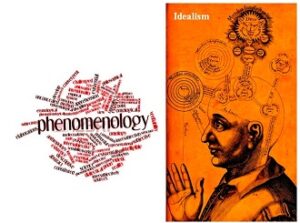
The idealist crisis and the ontological recovery
The evolution of the Enlightenment in both politics and economics culminated in Hegelianism, after passing through Kant’s critique of reason, it is the last great theory that seeks to realize an “integrated” totality, subject to “dialectical” contradictions (it is different from the dialectic of classical antiquity) and, according to his model, the ultimate aim would be to reach the full spiritual essence, which has little or nothing to do with religiosity.
after passing through Kant’s critique of reason, it is the last great theory that seeks to realize an “integrated” totality, subject to “dialectical” contradictions (it is different from the dialectic of classical antiquity) and, according to his model, the ultimate aim would be to reach the full spiritual essence, which has little or nothing to do with religiosity.
It was thus the dialectical materialist asceticism that ended in an enormous void and in the “forgetfulness of being”, a term used by Heidegger to contradict the theories that since Descartes have emptied and criticized the metaphysical reading of reality, in the etymology of the word meta-physis, in this case the Greek, since its origin is from there, according to Aristotle it was the first science, it gave solid knowledge about things, and the study is confused with ontology, the “being as being”.
For Kant this study is confused with that of customs, it is a non-empirical or rational knowledge, his study on morality and “subjectivity” will start from this relationship with cultural customs and here there is already a strong dose of relativism, and deepens the dualism between Subject x Object, forgetting the “Being”.
So that which is subjective, theoretical or metaphysical is falling into disrepute and theories of objectivity, practicality and empirical realism grow, this will not be done without contradiction, but the very definition of idealist dialectic is this, the development of this concept from from yourself.
Plato defined dialectics as the art of thinking, questioning and organizing ideas (Greek eidos – image, we already posted something), so neither theory is out of the question (idealism is also a theory, by the way, not very practical) , neither metaphysics nor “being”.
The theo-ontology of the end of the measured age will establish the relations between the entity and the being, according to Thomas Aquinas he “is infinite. Therefore, if it becomes finite, it must be limited by something, which has the capacity to receive it, that is, by the essence”, present in his thesis “The entity and the essence”.
Amidst the crisis of idealist thought, see the previous post, a new current emerges from Franz-Brentano in the mid-nineteenth century, which resumes phenomenology and ontology working on the intentionality of human consciousness, which was a specific study in Thomas Aquinas, to try to describe, understand and interpret the phenomena as they appear to perception.
Brentano was Husserl’s teacher, who rereads Descartes and Kant, and elaborates phenomenology with a different meaning given by his teacher Brentano, seeks to separate what is empirical, so the phenomenon of the mental act is not something that appears instantly in the mind, but depends on the memory and elaborates from there the concepts of protension and retension, the discussion about what is consciousness today reaches the objects of Artificial Intelligence.
Heidegger was a student of Husserl, and from him one can consider both the linguistic turn (not all authors agree) and the ontological resumption.









